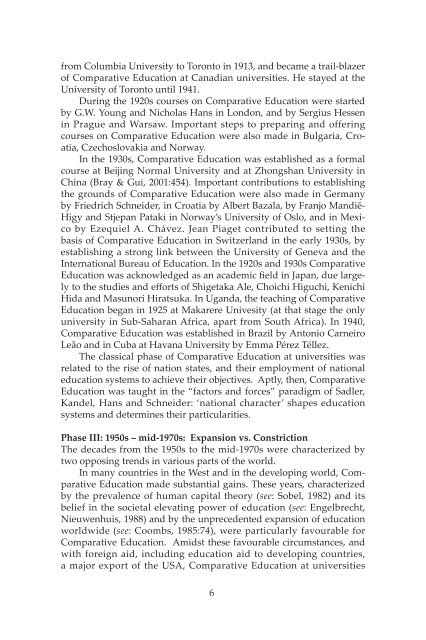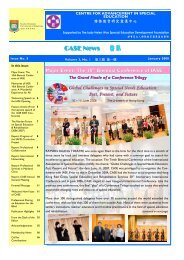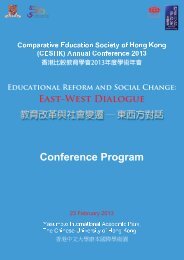Comparative Education Bulletin - Faculty of Education - The ...
Comparative Education Bulletin - Faculty of Education - The ...
Comparative Education Bulletin - Faculty of Education - The ...
Create successful ePaper yourself
Turn your PDF publications into a flip-book with our unique Google optimized e-Paper software.
from Columbia University to Toronto in 1913, and became a trail-blazer<br />
<strong>of</strong> <strong>Comparative</strong> <strong>Education</strong> at Canadian universities. He stayed at the<br />
University <strong>of</strong> Toronto until 1941.<br />
During the 1920s courses on <strong>Comparative</strong> <strong>Education</strong> were started<br />
by G.W. Young and Nicholas Hans in London, and by Sergius Hessen<br />
in Prague and Warsaw. Important steps to preparing and <strong>of</strong>fering<br />
courses on <strong>Comparative</strong> <strong>Education</strong> were also made in Bulgaria, Croatia,<br />
Czechoslovakia and Norway.<br />
In the 1930s, <strong>Comparative</strong> <strong>Education</strong> was established as a formal<br />
course at Beijing Normal University and at Zhongshan University in<br />
China (Bray & Gui, 2001:454). Important contributions to establishing<br />
the grounds <strong>of</strong> <strong>Comparative</strong> <strong>Education</strong> were also made in Germany<br />
by Friedrich Schneider, in Croatia by Albert Bazala, by Franjo Mandiě-<br />
Higy and Stjepan Pataki in Norway’s University <strong>of</strong> Oslo, and in Mexico<br />
by Ezequiel A. Chávez. Jean Piaget contributed to setting the<br />
basis <strong>of</strong> <strong>Comparative</strong> <strong>Education</strong> in Switzerland in the early 1930s, by<br />
establishing a strong link between the University <strong>of</strong> Geneva and the<br />
International Bureau <strong>of</strong> <strong>Education</strong>. In the 1920s and 1930s <strong>Comparative</strong><br />
<strong>Education</strong> was acknowledged as an academic field in Japan, due largely<br />
to the studies and efforts <strong>of</strong> Shigetaka Ale, Choichi Higuchi, Kenichi<br />
Hida and Masunori Hiratsuka. In Uganda, the teaching <strong>of</strong> <strong>Comparative</strong><br />
<strong>Education</strong> began in 1925 at Makarere Univesity (at that stage the only<br />
university in Sub-Saharan Africa, apart from South Africa). In 1940,<br />
<strong>Comparative</strong> <strong>Education</strong> was established in Brazil by Antonio Carneiro<br />
Leão and in Cuba at Havana University by Emma Pérez Téllez.<br />
<strong>The</strong> classical phase <strong>of</strong> <strong>Comparative</strong> <strong>Education</strong> at universities was<br />
related to the rise <strong>of</strong> nation states, and their employment <strong>of</strong> national<br />
education systems to achieve their objectives. Aptly, then, <strong>Comparative</strong><br />
<strong>Education</strong> was taught in the “factors and forces” paradigm <strong>of</strong> Sadler,<br />
Kandel, Hans and Schneider: ‘national character’ shapes education<br />
systems and determines their particularities.<br />
Phase III: 1950s – mid-1970s: Expansion vs. Constriction<br />
<strong>The</strong> decades from the 1950s to the mid-1970s were characterized by<br />
two opposing trends in various parts <strong>of</strong> the world.<br />
In many countries in the West and in the developing world, <strong>Comparative</strong><br />
<strong>Education</strong> made substantial gains. <strong>The</strong>se years, characterized<br />
by the prevalence <strong>of</strong> human capital theory (see: Sobel, 1982) and its<br />
belief in the societal elevating power <strong>of</strong> education (see: Engelbrecht,<br />
Nieuwenhuis, 1988) and by the unprecedented expansion <strong>of</strong> education<br />
worldwide (see: Coombs, 1985:74), were particularly favourable for<br />
<strong>Comparative</strong> <strong>Education</strong>. Amidst these favourable circumstances, and<br />
with foreign aid, including education aid to developing countries,<br />
a major export <strong>of</strong> the USA, <strong>Comparative</strong> <strong>Education</strong> at universities<br />
6
















